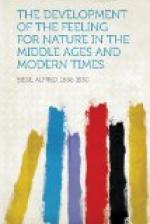The heart of our sorrowful
Firmian grew sadder yet, as he stood
upon this cold, burnt-out
hearth-place of Nature.
and in spring
it seemed to him as if his life dwelt, not in a bodily heart, but in some warm and tender tear, as if his heavy-laden soul were expanding and breaking away through some chink in its prison, and melting into a tone of music, a blue ether wave.
And Titan expresses that inner enfranchisement which Nature bestows upon us:
Exalted Nature! when we see and love thee, we love our fellow-men more warmly, and when we must pity or forget them, thou still remainest with us, reposing before the moist eye like a verdant chain of mountains in the evening red. Ah! before the soul in whose sight the morning dew of its ideals has faded to a cold, grey drizzle ... thou remainest, quickening Nature, with thy flowers and mountains and cataracts, a faithful comforter; and the bleeding son of the gods, cold and speechless, dashes the drop of anguish from his eyes, that they may rest, far and clear, on thy volcanoes, and on thy springs and on thy suns.
This is sunset in his abstruse artistic handling:
The sun sinks, and the earth closes her great eye like that of a dying god. Then smoke the hills like altars; out of every wood ascends a chorus; the veils of day, the shadows, float around the enkindled transparent tree-tops, and fall upon the gay, gem-like flowers. And the burnished gold of the west throws back a dead gold on the east, and tinges with rosy light the hovering breast of the tremulous lark—the evening bell of Nature.
And this sunrise:
The flame of the sun now shot up ever nearer to the kindled morning clouds; at length in the heavens, in the brooks and ponds, and in the blooming cups of dew, a hundred suns rose together, while a thousand colours floated over the earth, and one pure dazzling white broke from the sky. It seemed as if an almighty earthquake had forced up from the ocean, yet dripping, a new-created blooming plain, stretching out beyond the bounds of vision, with all its young instincts and powers; the fire of earth glowed beneath the roots of the immense hanging garden, and the fire of heaven poured down its flames and burnt the colours into the mountain summits and the flowers. Between the porcelain towers of white mountains the coloured blooming heights stood as thrones of the Fruit-Goddess; over the far-spread camp of pleasure blossom-cups and sultry drops were pitched here and there like peopled tents; the ground was inlaid with swarming nurseries of grasses and little hearts, and one heart detached itself after another with wings, or fins, or feelers, from the hot breeding-cell of Nature, and hummed and sucked and smacked its little lips, and sung: and for every little proboscis some blossom-cup of; joy was already open. The darling child of the infinite mother, man,




